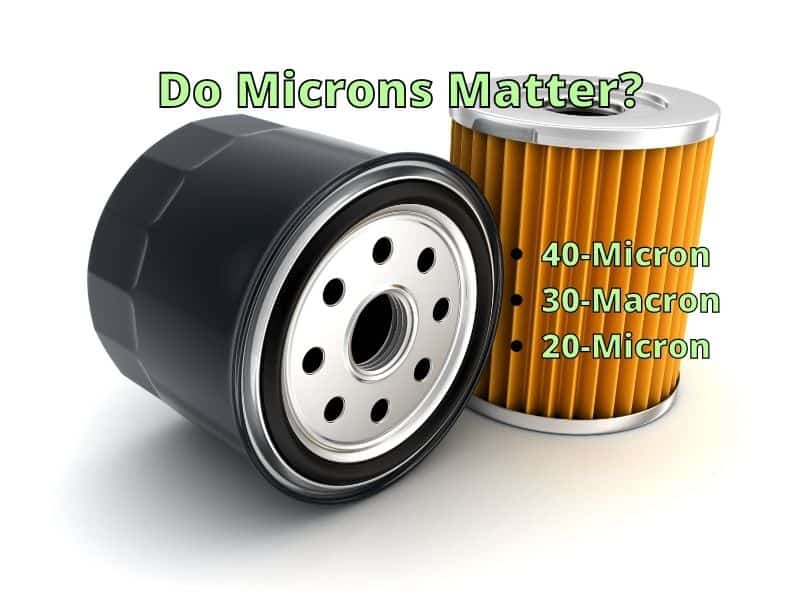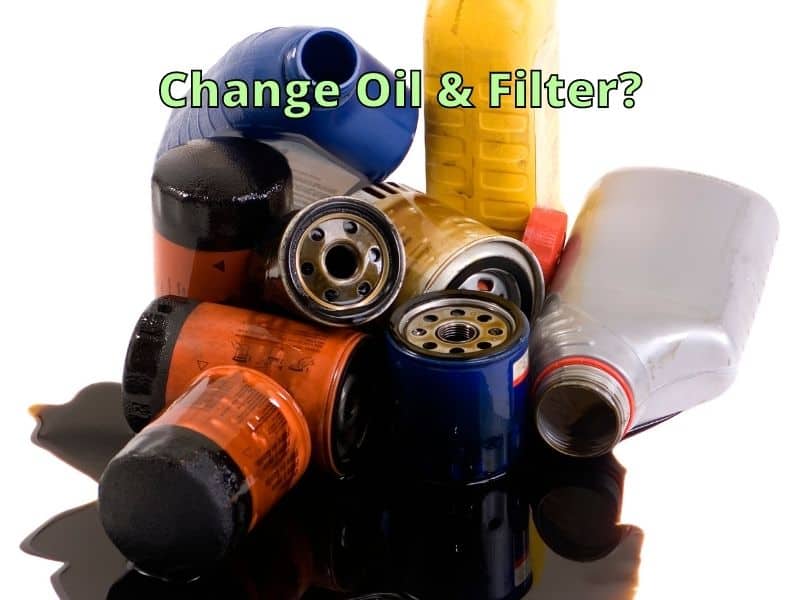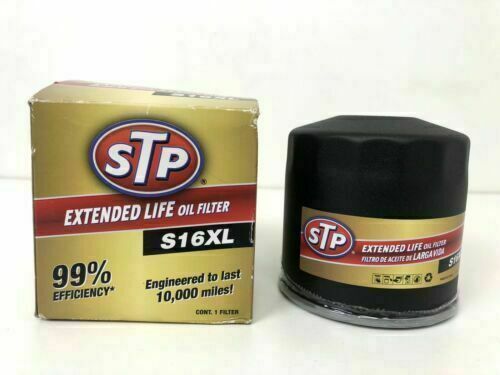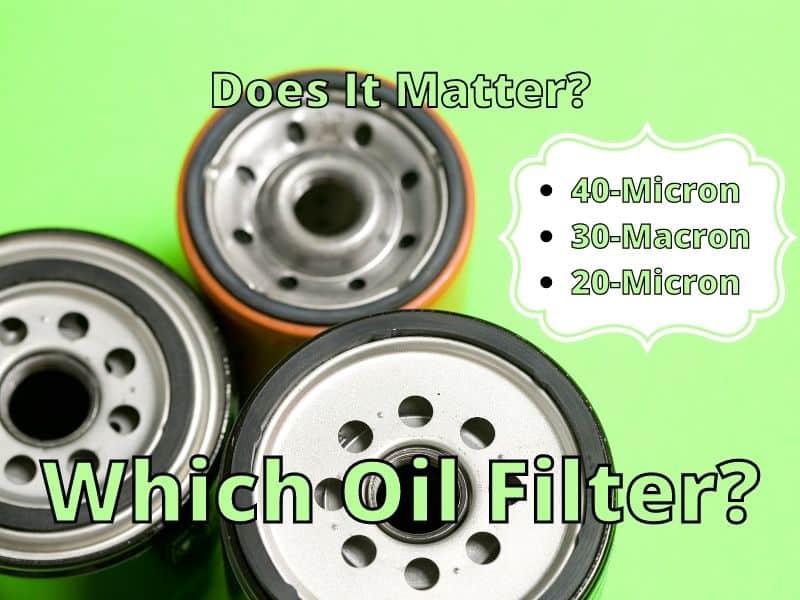For most car owners, keeping their vehicles in their engine running well is important. Does it matter what oil filter you use? I’ve always believed that it doesn’t matter much, but from recent evidence, I now feel different.
Getting a quality synthetic 99% efficiency 20-micron oil filter is likely best for your Vehicle. Only the correct model number will work for your specific vehicle. The build quality and regular changing of your oil filter plays an important role in helping your engine last longer. (see video below)
When changing your oil at a shop or at home you can specify the type of filter you want most of the time. Getting a good filter can help your car stay in top condition. We’ll discuss ways to decide on the right filter for your can and which ones to avoid.
Choosing Your Oil Filter
There are many oil filters to choose from. After doing my own research I have found that quality oil filters can make a difference. Yet, if you just need a filter quick I would look for a 20-micron synthetic filter. If you have the time to research, then you can find videos and articles that may help you narrow down the field.
I’ll share videos and information from articles about what I’ve learned so you can find a good filter for your vehicle.
1. Recognize Oil Filter Limitations
To get the best oil filter you need to also recognize the limitations of oil filters as well. Even if an oil filter claims it can last 15K miles, changing your oils every 15k miles could harm your engine. And reusing an oil filter with new oil can also harm your car.
Filters and oil give you the maximum limits, so they can help you recognize how well they are designed to do their job, not as a recommendation of how long to use them.
If you were chased by a lion, you could probably run a lot further than without that motivation, but eventually, you would fail and damage to your body would likely occur along the way from running so far. It’s the same with filters and oil. It’s always best to change them as recommended by the manufacturers, usually 3-5k miles. (We’ll talk more about this later.)
2. Which Model Of Oil Filter To Get?
One of the first things that you should do is to be familiar with is that different vehicles require specific models of filters. If you see a filter that doesn’t say it’s for a specific type of car, you’ll need to look at the model number and find out if it will fit your car.
Luckily, most places that sell oil filters will let you enter the model of your vehicle and show you oil filters that are compatible with your car. You’ll likely get a list of filters to choose from and then you can select one that meets your criteria.
There may be other features that play a role in helping protect your engine as well, but the best choice is to find the right model and my choice would be to use synthetic media. Let’s find out why.
3. Which Oil Filter Media To Choose?
The cheapest filters are made of “cellulose” or wood pulp and the more expensive synthetic oil filters are made with “micro-glass” which is fiberglass or it may say “synthetic media” which can be made from resin.
One of the most important parts of the oil filter is the filter media. The media captures the dirt, metal, and particles in your engine. A cellulose media filter might capture 40-micron sized particles, but a typical synthetic media filter can capture up to 20-microns. So, synthetic media can capture smaller particles.
Synthetic media can also capture more particles. Being able to capture smaller particles and more particles makes a synthetic filter likely your best choice for the best filter to get.
According to pgfilters.com “switching from a 40-micron oil filter to a 30-micron oil filter can reduce engine wear by as much as 50%.”
4. Which Micron Oil Filter Number Should I Choose?

The best filters are synthetic filters. Many of these filters state they filter up to 20-micron. The smaller the micron filter the better it likely will filter particles. As mentioned previously a small decrease from 40 to 30 makes a big difference, so choosing 20 over 25 could also make a big difference.
More Interesting Information
In addition, if you could find (I couldn’t) a filter that is longer than another oil filter this can also have a significant impact on filtering ability. According to machinerylubrication.com if you “Double the size of the filter and you can triple the service life (dirt-holding capacity)”
To go along with this, it’s generally better to have more pleats because it means more surface area to trap more particles. In addition, a thicker filter can filter more particles as well.
You might see mileage numbers on the boxes of oil filters ranging from 3,000 to 20,000 miles. Some 20-micron oil filters claim they can last 20,000 miles. While the smaller the microns the more it can filter, changing filters and oil should be done based on factors discussed later.
5. Find Out The Oil Filter Efficiency
Once you find out how many microns the filter is the next number to look for is the percentage efficiency that the filter states. For example, most filters will say 99% efficiency while others may state a lower percentage.
Sometimes it can be difficult to find the efficiency rating. When looking for the efficiency rating for the K&N oil filter, I went to Amazon.com, then K&N’s website, and finally found a number on a random website.
If you find two filters that have 20-micron media, just make sure to get the one that has a higher efficiency rating. That way it will capture more particles.
6. Do the Materials In The Oil Filter Matter?
I love this video because it shows that a more expensive filter isn’t always better quality. The video is a bit long, so if you just want the short advice video for his top picks you can check out his other video. (youtube.com)
Oil filter manufacturers make thousand of oil filters at a time. They mass produce products at the cheapest price within a certain level of quality. It makes sense that the internal parts of oil filters may be the same or similar from brand to brand. The goal is to find the ones with the best quality parts.
There are two important parts of the oil filter, which should be made from high-quality materials. The first one is the shell, which refers to the outer cover or the housing of the filter. It should be made from a material that can resist rust and corrosion.
The second is the filter itself. The material of the filter is important and how solid the frame is. The filter should be able to hold up over thousands of miles without breaking down.
Here’s a list of things to consider when considering which filter you should buy next.
- It should have a tight gaskets.
- The housing should be made of metal to avoid particals of cardboard from coming off.
- It shoud have plenty of inlet holes that are large enough.
- It should have an effective bypass valve.
- The number of pleats may contrilbute to overall filtering ability.
- It should not be contaminated with oil, rust, scratches, or glue from the factory. Good quality control.
7. Should I Change The Oil And The Filter At The Same Time?

The simple answer is that you should change the oil and the filter at the same time as recommended by your vehicle manufacturer. Synthetic oil and synthetic filters can last longer than the standard oil and standard filters, but the properties of the oil and the filter have changed enough after 3-5K miles to necessitate changing them.
The great thing about synthetic oil and synthetic filters is they can provide great protection for your engine.
Can I use regular or synthetic oil with a synthetic oil filter?
You can use either type of oil with a synthetic oil filter. The synthetic part of the oil filter means the fibers of the filter are not wood pulp but fiberglass or resin, so they will accept any type of oil made for your car.
Why do I need to change the oil and filter at 5k if they can last longer?
Oil not only lubricates and carries particles to the filter, but it also carries “combustion by-products” (familyhandyman.com) and helps with other chemical processes. After a few thousand miles the oil has changed, and is no longer as capable as it was at the beginning.
The same can be said for the oil filter. Sure, it can hold a certain amount of particles, but there is a certain amount of guesswork involved. Each engine is different and you just can’t be sure how much wearing has occurred or how full of particles the filter is.
Sometimes the oil can bypass the filter when pressure is high. Then all of those particles will continue to accumulate in the oil and cause wear, especially if the filter is full.
And your fuel efficiency will also be affected. “It takes energy and power from the engine to push oil through an overly restricted oil filter.” (machinerylubrication.com)
It’s best to change the oil and filter at regular intervals to get the most out of your engine and car’s performance.
Do I need to change the oil and filter at the same time?

The filter to the right claims to be able to last 1 year or 20,000 miles. While learning about different oil filters this one seems to be a good one in my opinion, and it probably can last 20,000 miles.
Yet, I wouldn’t push any filter past 5k miles because the oil and the filter have changed as mentioned before.
If you change the oil and not the filter, you push new oil through a dirty filter, and not only will the oil flow be impacted, it may also pick up particles from the filter and reintroduce them into the engine.
If you change the filter and not the oil, the oil won’t be as effective at neutralizing acids and protecting the engine from oxidation.
It’s best to change your oil and filter at the same time and at regular 3-5k intervals or as suggested by the car manufacturer, so you get the best cleaning and engine performance.
8. Should I Buy A Filter That Is Easy To get off?
An oil filter does not require professional installation. Most are easy to do by yourself if you are willing to get a little messy. Make sure to read the manufacturer’s instructions for specific installation details.
Some filters come with a textured grip or a special area for a wrench when uninstalling. This will make it easy to take the filter off when it needs to be removed. Abrasive surfaces will allow you to unscrew a filter if it is oily under your car or oil gets on the filter.
Unsure which one will make the best choice for an oil filter? If you have a good oil wrench you should be fine with any oil filter, so you can focus on getting a filter that is high quality instead of which is easiest to uninstall.
9. Does An Oil Filter Warranty Matter?
What happens if the oil filter becomes defective? What if it was not able to deliver the performance that the manufacturer promised?
Most warranties only cover the replacement of the oil filter if you see there is a problem after opening it.
It might be difficult to prove that an oil filter caused problems for your car. Yet, if you take the car to a mechanic and document everything that happened after you got the filter installed, you will be more likely to get compensation if a filter is faulty.
Although most products will have a one-year warranty, don’t expect anything other than a free replacement of the filter if you are not satisfied with the product.
My Choice For Oil Filters To Use
After learning about the internal parts of oil filters, I am both impressed and distressed. Oil filters need to be low priced to stay competitive. They are generally built well enough to do their job although sometimes quality control can be an issue.
It’s best to get an oil filter that has a solid metal construction on the inside so the filter functions properly, the media stays in place, and so it doesn’t lose structural integrity over time.
If you have a high-performance car, then the internal construction may matter more, since the oil may get hotter than normal and may start to degrade parts of the oil filter that aren’t metal construction.
It seems the best oil filters available for most cars are ones that can filter oil at 99% efficiency at 20-microns. With that in mind and considering how well made the oil filters are made, here are my top three choices for oil filters if I had to choose one today.
1. FRAM Ultra Synthetic Oil Filter

Although this filter claims to have a longer life span than a conventional oil filter I still would change it at 5k miles for the best protection of my engine.
This filter beats a lot of other filters because it can hold particles up to 20-microns at 99% efficiency. Other filters at 25-microns or more are going to wear down the engine parts much quicker.
I was looking at the Bosch extra life filter and hoping to put it on this list because it has some great features until I found out it filters at 40-microns. That would wear down your engine much faster.
The Fram filter uses synthetic media so it can hold a lot of particles. It doesn’t have as many pleats as other filters but is the media super thick, so that should allow it to capture just as many or more particles.
The metal construction on the ends and in the middle make this filter one that can stand up to harsher conditions or like the product states can last longer.
The one downside may be the cellulose and glass blended media. Cellulose is a paper product and has been known to fall apart under extreme conditions, but it may be that the cellulose is contained within the glass so it can’t escape. The positive thing about cellulose is if there happens to be any water in the oil it can absorb it.
Features
- 99%+ dirt removal efficiency at greater than 20 microns
- Solid metal interanal construction around filter media
- Dual layered, synthetic media traps
- Silicone anti-drainback valve
- Cellulose and glass blended media

2. STP Extended Life Oil Filter

You can find this filter at autozone.com for $10 currently.
Although this filter claims to have a 10k mile life span, I would still change it to 5k miles for the best protection of my engine.
This filter works well because it can filter at 20 microns at 99% efficiency, just like the previous filter. Other filters at 25 microns or more are going to wear down the engine parts much quicker.
This filter has a solid metal construction inside and has a densely packed pleated media filter.
While researching different filters, I’ve found many well-constructed filters, but the problem with them was that although people gave them good reviews, they couldn’t filter well. They ranged from 25-50 microns.
The STP filter uses synthetic resin media, so it can hold a lot of particles. It has lots of pleats, but the media is thinner than the Fram filter. However, it should capture particles fairly well.
The metal construction on the ends and in the middle make this filter one that can stand up to harsher conditions or, like the product states, can last longer.
Features
- 99%+ dirt removal efficiency at greater than 20 microns
- Solid metal interanal construction around filter media
- Silicone anti-drainback valve
- Synthetic resin media
3. Bosch Premium FILTECH Oil Filter

Although I could not find the information for the micron levels on the Bosch website or Amazon.com, there are several websites that claim this filter is 20-microns, so I decided to add it to my list.
This filter claims to be 42 percent larger than conventional filters and 30 percent thicker.
This filter should work well for most people because it can filter at 20-microns at 99% efficiency like the other filters on this list.
This filter has a solid metal construction inside, which says that it can hold up to 14 grams of dirt.
The end caps for the filter look like they are made of plastic, but one customer opened it up after using it and found that it was well constructed.
The STP filter uses “natural and synthetic materials” for the media. This seems a lot like the Fram filter, so the cellulose may help absorb any water in the oil, or it may be there to reduce product costs.
Features
- 99.9% dirt removal efficiency at greater than 20 microns
- Solid metal center tube
- Holds 14 grams of dirt
- Silicone anti-drainback valve
- Synthetic glass and natural media
Conclusion
In summary, choosing an oil filter can be a bit tricky because you aren’t given all the details about all aspects of the product, even from the manufacturer’s website sometimes.
I have found that most products that claim to be long-life products are manufactured better than the standard oil filter and usually have a good micron level, but not always.
Look for a 99% efficiency rating at 20-microns and this will likely give you the best filter for the reduction of wear in your engine.
Thanks for visiting Drivinglife.net
References
machinerylubrication.com
bobistheoilguy.com
